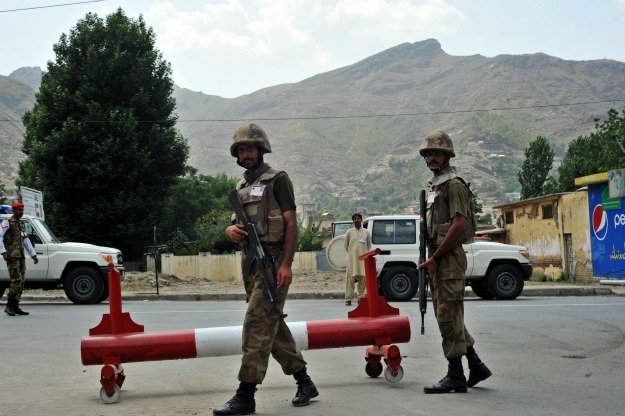News Analysis |
Foreign Minister Khawaja Asif said that Pakistan has offered the US joint operations against the Haqqani Network, provided the US has actionable intelligence and evidence of the network’s presence in Pakistan. The 67-year old said this in an interview with a private TV Channel in Pakistan.
The US has been alleging Pakistan of harboring the Haqqani Network, something which flowed in the new South Asia policy announced by President Trump in August this year. Trump had called out Pakistan for supporting agents of chaos.
If such a mechanism is to be devised, there is a need to reduce trust deficit, which can be done through continued engagements at the military and diplomatic levels
“We have offered American authorities to visit Pakistan with evidence of Haqqani network’s safe havens in the country. If they find any activity [of Haqqanis] in the targeted areas, our troops along with the US would destroy them once and for all,” Asif said.
Read more: American military playing good cop & bad cop with Pakistan
The US and Afghanistan attribute the brazen resurgence of the Taliban to the alleged support provided by Pakistan to the Haqqani Network- one of the most fierce factions of the Afghan Taliban.
Khawaja Asif went on to say that General Bajwa also made a similar offer to Afghan President, Ashraf Ghani during his one-day visit to Kabul on 1st October.
Borrowing Courage: Banking on ‘Friends’
As part of Pakistan’s strategy to thwart mounting threats from the US, Khawaja Asif undertook a series of visits to garner diplomatic support. Showing confidence in the assurances given by regional players, Asif said: “If the Trump administration exerts more pressure on us, friendly countries, especially China, Russia, Iran, and Turkey, will stand by our side.”
Joint military operations cannot be carried out if both parties mistrust each other. The Pakistani strategic community cannot help but raise eyebrows on the growing Indo-US defense relations
The confidence stems from the fact that these countries have been critical of the effectiveness of the military-heavy South Asia policy announced by the US for fighting the war in Afghanistan. After signs of a thaw in strained ties, the two countries have again taken to verbal spats. Reportedly, President Trump will send two high officials in Secretary of State Rex Tillerson and Defense Chief James Mattis with a strong message and warning for Islamabad.
Read more: Can Americans seize Pakistan’s nuclear bomb?
Asif retorted and said: “If the US secretary of state and secretary of defense are coming to dictate us, we will refuse to accept their dictates…and now we will do what is in the best interest of our country.” The strong statement of the country’s top diplomat comes a day after Prime Minister Shahid Khaqan Abbasi said that Pakistan is not dependent on the US for its defense needs.
The US and Afghanistan are also wary of Pakistan’s alleged involvement in subversive activities inside Afghanistan
The recent wave of mistrust can be ascribed to Mattis’ statement regarding the China-Pakistan Economic Corridor (CPEC) and its passage through a disputed territory. This is being seen as yet another token of US support for its new ally India- a forceful mistrust propellant.
No Trust, No Jointness
The idea of joint military operations against alleged militant hideouts is apparently untenable. There are a number of reasons which precludes joint efforts. Pakistani military forces have, by and large, evicted terrorists from their strongholds; normalcy has been restored in areas once controlled by militants.
The confidence stems from the fact that these countries have been critical of the effectiveness of the military-heavy South Asia policy announced by the US for fighting the war in Afghanistan
However, the US does not believe that Pakistan has carried out operations to target miscreants of all hue and color. Thus, the question of trust rather than ability comes into the mix. Joint military operations cannot be carried out if both parties mistrust each other. The Pakistani strategic community cannot help but raise eyebrows on the growing Indo-US defense relations.
Read more: James Mattis warns Pakistan; ‘Do more’ or face consequences
The US and Afghanistan are also wary of Pakistan’s alleged involvement in subversive activities inside Afghanistan. Both the US and Afghanistan believe that Pakistan is still stuck in the infamous concept of “strategic depth” despite the changing circumstances.
If such a mechanism is to be devised, there is a need to reduce trust deficit, which can be done through continued engagements at the military and diplomatic levels. If trust is restored then there will be little need for joint operations because the US would first understand the extent of Pakistan’s counterterrorism operations, and also the ability to target the remnants.














